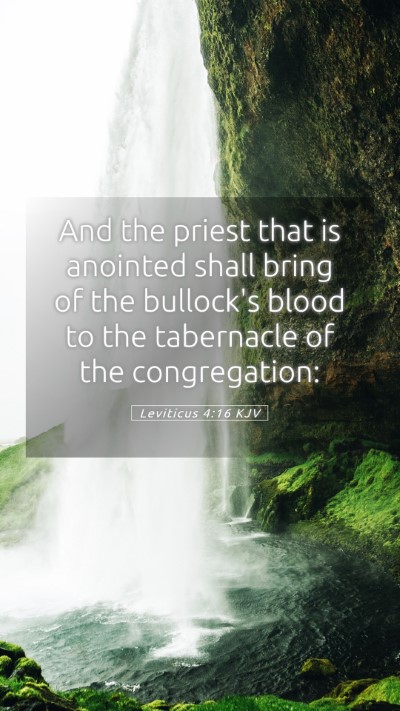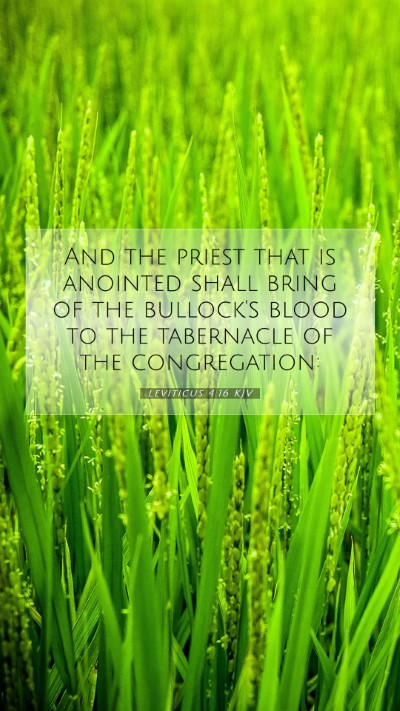Overview
This verse deals with the sacrificial system established for the atonement of sin within the community of Israel, specifically outlining the duties of the anointed priest in the process of sin offerings.
Bible Verse Meanings
The meaning of this verse can be explored through various biblical commentaries that provide insights into its cultural, historical, and theological significance.
Commentary Insights
-
Matthew Henry:
Henry emphasizes the role of the anointed priest as a mediator who represents the people before God. The act of taking the sacrificial blood to the tabernacle signifies the seriousness of sin and the necessity of atonement, portraying the priest as a figure of intercession.
-
Albert Barnes:
Barnes elaborates on the importance of the sacrificial blood, noting that it symbolizes life and reconciliation. The priest's actions are not merely ritualistic but are filled with profound meaning regarding the covenant relationship between God and His people.
-
Adam Clarke:
Clarke points out the significance of the tabernacle as the dwelling place of God among His people. The requirement for the priest to bring the blood inside highlights the holiness of God and the necessary steps for purification and forgiveness of sins.
Bible Verse Interpretations
The interpretations of Leviticus 4:16 reveal layers of meaning that transcend its historical context, bringing relevance to modern readers. Understanding Scripture requires recognizing the sacrificial system as a foreshadowing of Christ's ultimate sacrifice.
Symbolism and Application
-
Atonement:
The act of bringing blood to the tabernacle underlines the principle of atonement central to both the Old Testament sacrificial system and the New Testament teaching of Christ's blood shed for humanity.
-
Priestly Role:
The anointed priest serves as a mediator, analogous to Christ, who fulfills this role for believers today. This connection invites readers to reflect on the nature of Jesus' ministry and sacrifice.
-
Holiness of God:
The necessity of bringing blood to the holy place underscores God's holiness and the gravity of sin, urging believers to approach God with humility and reverence.
Historical Context
Leviticus was written during a pivotal time in Israel's history as they established their identity and covenant with God. This context enhances our understanding of the significance of sacrifices and the priesthood.
Significance of the Verse
The significance of Leviticus 4:16 lies in its theological implications regarding sin, atonement, and God's desire for a reconciled relationship with humanity. Each action outlined in this verse points to deeper truths about spiritual life and health.
Cross References
- Hebrews 9:22 - "And almost all things are by the law purged with blood; and without shedding of blood is no remission."
- Leviticus 16:15 - "Then shall he kill the goat of the sin offering, that is for the people, and bring his blood within the vail."
- Romans 3:25 - "Whom God hath set forth to be a propitiation through faith in his blood..."
- Exodus 30:10 - "And Aaron shall make an atonement upon the horns of it once in a year..."
- 1 Peter 2:9 - "But ye are a chosen generation, a royal priesthood, an holy nation, a peculiar people..."
Conclusion
In conclusion, Leviticus 4:16 serves not only as a historical account of sacrificial practices but also as a poignant reminder of God's holiness, the seriousness of sin, and the provision for atonement that ultimately finds fulfillment in Jesus Christ. This deepens our Bible study insights and encourages us to explore the vast resources available for biblical exegesis.
For Further Study
- Bible Study Groups: Consider discussing the implications of Leviticus 4:16 in a group setting.
- Online Bible Study: Access digital tools for deeper exploration of scripture.
- Bible Study Guides: Use guides that focus on Old Testament sacrifices and their New Testament fulfillments.


